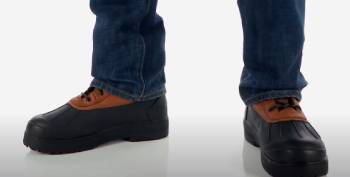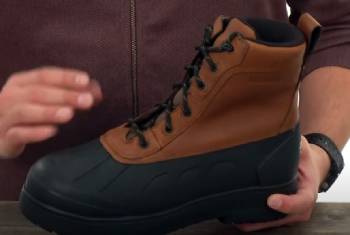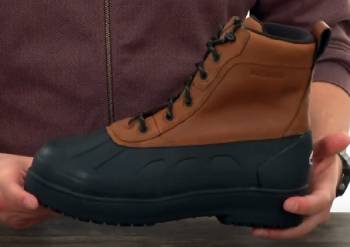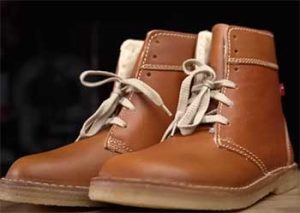When it comes to work boots, comfort, durability, and safety are the priorities. After all, your boots need to withstand everything you throw at them, whether it’s long shifts on hard surfaces or trudging through wet and muddy conditions. That’s where Iron Age boots come in. Known for their rugged construction and high-performance design, these boots promise to offer everything you need for tough working environments.
I had the chance to try out a pair of Iron Age boots recently, and I’ve been using them for a while now. If you’re wondering whether these boots are the right choice for you, stick with me as I walk you through my experience, the pros and cons, and how Iron Age boots stack up against other top brands in the industry.
Why Should You Buy Iron Age Boots?

If you’re on the hunt for boots that combine durability with comfort, Iron Age boots might just be what you need. Let’s face it: no one wants to spend hours on their feet in uncomfortable, low-quality boots.
But with Iron Age, you don’t have to worry about that. The boots I tried were designed to offer excellent comfort and support right out of the box, and they quickly became my go-to pair for long shifts.
Their standout features include sturdy construction, strong leather, waterproofing (depending on the model), and an abrasion-resistant outsole.
What really caught my attention is how Iron Age boots address the specific needs of workers like me who spend long hours on their feet.
If you’re tired of trying boots that claim to be comfortable but don’t deliver, Iron Age boots might be the answer.
Tips for Maintaining Your Iron Age Boots

- Clean Regularly: Keeping your boots clean is essential to extending their lifespan. After a long day at work, make sure to clean off any dirt or debris. A simple wipe-down with a damp cloth can keep the leather looking new and prevent buildup that can damage the material over time.
- Waterproofing Spray: While many Iron Age boots come with waterproofing built-in, it’s always a good idea to refresh the waterproofing with a quality spray. This will help maintain the boots’ ability to keep your feet dry, especially if you work in wet conditions.
- Regularly Check for Wear: As mentioned, the soles of Iron Age boots can wear out over time, especially with heavy use. Be sure to regularly check the soles for signs of damage and consider getting them resoled if needed. This can extend the life of your boots significantly.
- Store Properly: When not in use, store your boots in a cool, dry place. Avoid leaving them in direct sunlight or in damp areas, as this can cause the leather to crack or warp over time.
Pros and Cons of Iron Age Boots

Pros:
- Unmatched Comfort: The first thing I noticed when I slipped into my Iron Age boots was how comfortable they felt. The boots are designed with padded collars and insoles that offer support, making them ideal for long work hours. I often struggle with foot pain due to plantar fasciitis, and these boots provided relief almost instantly. The cushioning is excellent, and I didn’t experience any discomfort, even after a full day of standing and walking.
- Waterproofing (in Selected Models): Iron Age offers waterproof versions of their boots, making them perfect for workers in wet or rainy environments. I tested out one of their waterproof models (IA5062), and it did a great job of keeping my feet dry, even when I was walking through puddles or working in wet conditions. However, it’s worth noting that some users have mentioned minor issues with water seeping in through the tongue area, so it’s a good idea to pay attention to that detail when selecting your boots.
- Durability: Iron Age boots are built to last. I’ve had my pair for a while now, and they show minimal signs of wear and tear. The leather and stitching are strong, and the outsoles are designed to withstand heavy abrasion. Whether you’re working on hard surfaces or in tough conditions, you can trust that Iron Age boots will hold up.
- Safety Features: Iron Age boots come with a range of safety features, including steel toes and slip-resistant soles. As someone who works in an environment where safety is a priority, I appreciate the added protection these boots provide. I feel secure walking on slippery surfaces, and the steel toes give me peace of mind knowing my feet are protected from falling objects.
- Comfortable Right Out of the Box: One of the most common issues I’ve faced with other work boots is the break-in period. It can be frustrating to wear boots that hurt or cause blisters until they’re “broken in.” But with Iron Age boots, I didn’t experience that. They were comfortable from the first time I put them on, and I was able to wear them for hours without any discomfort.
Cons:
- Weight: While the boots are sturdy, they can feel a bit heavy, especially when compared to some other brands. If you’re used to lightweight boots, it might take some time to get used to the extra weight. However, I found that the added weight wasn’t a major issue once I got into my routine, and it provided the boots with extra durability.
- Breathability Issues: One drawback I encountered with the waterproof models was that my feet would get a bit sweaty during hot summer days. While the waterproofing kept my feet dry, it didn’t allow for much airflow, leading to some discomfort in warmer temperatures. Iron Age might want to consider designing a version with improved breathability for summer conditions.
- Durability of Soles: While the boots themselves are built to last, the soles of my Iron Age boots didn’t hold up as well as I had hoped. After several months of heavy use, the soles started to wear down faster than expected. This isn’t a dealbreaker for me, as I’ve had them resoled, but it’s something to keep in mind if you’re expecting the boots to last without any additional investment in maintenance.
Also Read: My Thoughts On Why Are La Canadienne Boots So Expensive
Iron Age Boots Vs. Other Brands
- Iron Age Boots Vs. Timberland PRO
Timberland PRO is a well-known brand for durable work boots, often featuring waterproof leather, reinforced toe protection, and anti-fatigue insoles. While Timberland PRO boots excel in comfort and slip resistance, Iron Age Boots are designed specifically for industrial workers who need extra durability and protection against harsh environments. Iron Age offers metatarsal guards and puncture-resistant soles, making them a top choice for hazardous job sites. If you’re looking for a balance between everyday comfort and heavy-duty protection, Iron Age Boots may provide better longevity and safety features compared to Timberland PRO.
- Iron Age Boots Vs. Red Wing
Red Wing boots are known for their handcrafted quality and premium leather, making them a popular choice for both work and casual wear. However, Iron Age Boots focus more on workplace protection, offering features like heat resistance, slip-resistant soles, and electrical hazard protection. While Red Wing may have an edge in long-term durability and aesthetics, Iron Age Boots cater specifically to those who need reliable, safety-certified footwear for demanding job sites. If function and affordability are your priorities, Iron Age Boots provide excellent protection without the premium price tag of Red Wing.
- Iron Age Boots Vs. Thorogood
Thorogood is a respected brand in the work boot industry, often featuring moc-toe designs, Goodyear welt construction, and high-quality American leather. While Thorogood boots are built to last and offer comfort for long workdays, Iron Age Boots provide more specialized protection, such as metatarsal guards and extreme heat resistance. Thorogood boots are ideal for carpenters and construction workers who prioritize comfort and craftsmanship, whereas Iron Age Boots are better suited for welders, industrial workers, and those needing maximum workplace safety. If protection is your primary concern, Iron Age may be the better choice.
- Iron Age Boots Vs. Wolverine
Wolverine boots are known for their comfort, lightweight design, and advanced cushioning, making them ideal for those who need all-day support. However, Iron Age Boots prioritize rugged durability and workplace safety features, such as puncture-resistant soles and impact protection. Wolverine boots are great for general construction and outdoor work, but Iron Age is better for those exposed to extreme conditions, like heavy machinery work or welding. If you need boots that can withstand high heat, sharp objects, and heavy impact, Iron Age Boots offer superior protection compared to Wolverine’s comfort-focused designs.
- Iron Age Boots Vs. Caterpillar
Caterpillar boots, inspired by the brand’s industrial machinery, are built for tough environments, featuring steel toes, slip-resistant outsoles, and waterproofing. While Caterpillar boots provide solid durability and all-around protection, Iron Age Boots take workplace safety a step further with features like Kevlar stitching, external met guards, and fire-resistant materials. Iron Age Boots are ideal for workers in high-risk industries who need maximum protection, while Caterpillar boots are better suited for general laborers needing reliable yet comfortable work footwear. If safety is your top priority, Iron Age Boots provide more specialized protection than Caterpillar.
Also Read: My Experience With Los Altos Boots
Frequently Asked Questions (FAQs)
Iron Age footwear is a brand owned by the global company, Wolverine Worldwide, which is known for its wide range of durable and high-performance footwear.
Iron Age offers a limited warranty on its boots, typically covering defects in materials or workmanship. The exact terms may vary, so it’s best to check with the retailer or manufacturer for specific details.
While steel toe boots provide excellent protection, they can sometimes cause discomfort if not properly fitted. They may also be a bit heavier than regular boots, leading to fatigue over long periods of use. In rare cases, they can cause foot injuries if they are too tight or not properly worn.
Iron worker boots tend to have a flat design to provide stability and prevent slips. The flat sole ensures better grip and reduces the risk of tripping or falling, especially in tough working environments like construction sites.
Final Thoughts
In conclusion, Iron Age boots are a solid choice for anyone in need of reliable, durable, and comfortable work boots. They may not be perfect for everyone, but they certainly offer a great balance of features, quality, and affordability.
Whether you’re a construction worker, a tradesperson, or someone who spends long hours on their feet, Iron Age boots can provide the support and protection you need. After wearing them for some time now, I can confidently recommend these boots to anyone looking for reliable work footwear.



